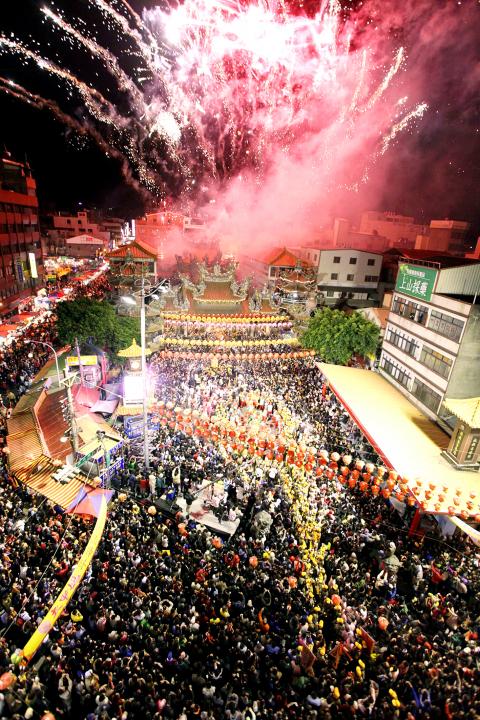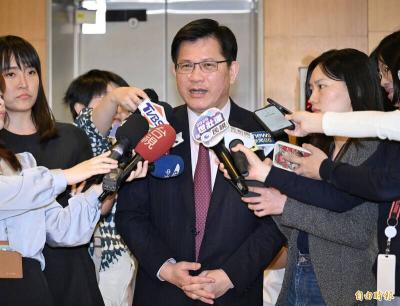The annual Dajia Matsu pilgrimage (大甲媽祖遶境) headed off on its nine-day and about 340km journey on foot at 11pm on Friday, with more than 100,000 people attending the departure event at the Jenn Lann Temple (鎮瀾宮) in Greater Taichung’s Dajia (大甲).
Amid the deafening sounds of drums, gongs, trumpets and firecrackers, and surrounded by a huge crowd of followers who poured into the small town as early as Tuesday, the Dajia Matsu pilgrimage — one of the nation’s biggest annual religious rites — took more than half an hour to depart from the temple’s courtyard.
A number of political figures — including President Ma Ying-jeou (馬英九), vice president-elect Wu Den-yih (吳敦義) and Legislative Speaker Wang Jin-pyng (王金平) — attended the departure event on Friday as Jenn Lann Temple president Yen Chin-piao (顏清標) announced the start of the pilgrimage.

Photo: Chan Chao-yang, Taipei Times
The temple’s administration estimated that more than a million people would participate in the pilgrimage this year.
The procession is set to travel on a fixed route from Dajia, traveling through Changhua and Yunlin counties, making brief stops at 111 temples in 21 townships before reaching its final destination — Fengtien Temple (奉天宮) in Chiayi County’s Singang Township (新港) — on Tuesday next week.
After attending a birthday celebration event for Matsu at Fengtien Temple, which will last about a day, the Matsu palanquin will once again take to the road at midnight, with a series of religious performance troupes taking the lead on its trip back to Dajia.

Photo: Chan Chao-yang, Taipei Times
In recent years, the pilgrimage has become a famous cultural tourism event, attracting visitors from across the country and from overseas, and has also been offering many business opportunities from selling Matsu cultural merchandise.
A special feature this year is that Jenn Lann Temple has provided an Internet service (mazu.gis.tw) teamed with a geographic information system, enabling people to get instant information on where the Matsu palanquin is, as well as providing access to photographs taken along the way.
The pilgrimage procession reached Changhua County at 2pm yesterday, about two hours later than scheduled, because there were too many followers lying on the road along the Matsu palanquin’s route, waiting for the palanquin to be lifted over their body — believing that it would bring good luck and fortune.
Changhua County has mobilized up to 800 police officers to control traffic and ensure the safety of followers along the procession route.

Taiwan would welcome the return of Honduras as a diplomatic ally if its next president decides to make such a move, Minister of Foreign Affairs Lin Chia-lung (林佳龍) said yesterday. “Of course, we would welcome Honduras if they want to restore diplomatic ties with Taiwan after their elections,” Lin said at a meeting of the legislature’s Foreign Affairs and National Defense Committee, when asked to comment on statements made by two of the three Honduran presidential candidates during the presidential campaign in the Central American country. Taiwan is paying close attention to the region as a whole in the wake of a

Chinese Nationalist Party (KMT) Chairman Eric Chu (朱立倫), spokeswoman Yang Chih-yu (楊智伃) and Legislator Hsieh Lung-chieh (謝龍介) would be summoned by police for questioning for leading an illegal assembly on Thursday evening last week, Minister of the Interior Liu Shyh-fang (劉世芳) said today. The three KMT officials led an assembly outside the Taipei City Prosecutors’ Office, a restricted area where public assembly is not allowed, protesting the questioning of several KMT staff and searches of KMT headquarters and offices in a recall petition forgery case. Chu, Yang and Hsieh are all suspected of contravening the Assembly and Parade Act (集會遊行法) by holding

President William Lai (賴清德) has appointed former vice president Chen Chien-jen (陳建仁) to attend the late Pope Francis’ funeral at the Vatican City on Saturday on his behalf, the Ministry of Foreign Affairs said today. The Holy See announced Francis’ funeral would take place on Saturday at 10am in St Peter’s Square. The ministry expressed condolences over Francis’ passing and said that Chen would represent Taiwan at the funeral and offer condolences in person. Taiwan and the Vatican have a long-standing and close diplomatic relationship, the ministry said. Both sides agreed to have Chen represent Taiwan at the funeral, given his Catholic identity and

Taiwan would welcome the return of Honduras as a diplomatic ally if the next president of that country decides to make such a move, Minister of Foreign Affairs Lin Chia-lung (林佳龍) said today. “We would welcome Honduras if they want to restore diplomatic ties with Taiwan after their elections,” Lin said during a legislative hearing. At the same time, Taiwan is paying close attention to the Central American region as a whole, in the wake of a visit there earlier this year by US Secretary of State Marco Rubio, Lin said. Rubio visited Panama, El Salvador, Costa Rica and Guatemala, during which he